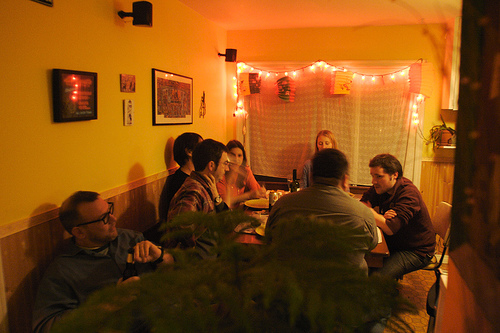The 3 days in Saskatoon for TLt2008 were absolutely fantastic. It’s fun turning into “conference D’Arcy” – the side of me that is ever so slightly less antisocial and reclusive – the side that seems to show up at conferences. Not sure why that is, but it’s something I’ve noticed for years now. Maybe it’s the sense of being “away” – one part vacation, one part safe place to let loose.
I’ve had some of the most interesting, stimulating, and just plain fun conversations. All of which occurred off-site, while hanging out in neighbouring pubs, coffee shops, or just walking. I’m not going to list names because that makes it sound like some stupid elitist club, and what was so great about these conversations is that they were nothing like that. Newcomers. Academics. Lay-people. Teachers. Students. Geeks. It just didn’t matter. And it was awesome.
One of the highlights of the official conference portion had to be Brian Lamb’s live mashup. This was something that many of the conference attendees were likely to have never seen before – and I think a good chunk of the attendees didn’t realize that it was actually a live performance on stage, and not just a visualization. But, really, how many other conference presenters go the extra mile, bringing their own rented audio amp and even a cowbell on a stand? Hard. Core.

After the mashup intro, Brian gave a great presentation on openness, sharing, and riffed on some pretty deep topics. He even pulled in Harry to help tug at the heart strings.
Rick Schwier gave a fantastic talk, sharing some wonderful advice and stories. Dean Shareski followed the theme with another fantastic talk called Share Everything, and managed to cover some of the ideology behind sharing while providing concrete and pragmatic examples and strategies.
George Siemens gave something like 14 presentations during the conference, citing some pretty profound neurological research studies in the process (I’m eagerly awaiting his pending publication of the Theory of the Universal Male Brain). He was extremely eloquent in describing the nature of connectedness, what connectivism could mean to education, and why networks (and Networks) matter.

As Scott Leslie noted on Flickr, George is another person who talks with his hands. He’s such a natural, engaging, and conversational speaker, and it is a joy to hear him share his stuff.
Stephen Downes blew some minds when he took the stage to talk about The Future. His presentation was amazing on so many levels – he was talking about futurism and predictions, but that’s not really what the presentation was about. It was about individuals taking control back. It was about not sitting passively, of crafting a future that you want, rather than waiting for The Future to be handed down to you. And he modeled some extremely engaging and brave presentation techniques – things that I am quite sure most of the people attending have never seen before.

He gave the big presentation screens to the audience. And not in some half-assed lame lip service manner. He quite literally gave control of the web page that was being displayed on the big screens to anyone with a web browser. He was running Edu_RSS, and was using a portion of the app that let people post any text (or HTML snippets) to be put into a queue to be displayed for 10 seconds in a large font on the big screen.
It’s something extremely profound. He’s not just talking about engaging the audience with scripted questions, or planting ringers in the crowd. He’s handing control over (or back) to the people. He had no idea what would be posted to the screens. Or if it would be relevant. Or interesting. Or even if anything would be posted at all.
Many of the posts were silly. Many were extremely silly. Many were questions, probing what Stephen was talking about. Many were providing additional or background information to support what was being said. But, even the silly ones were a valuable part of the presentation. Just the simple fact that a person could trivially post some text, even if only to add some comic relief, helps to show that letting go of control is not necessarily a bad, scary, or dangerous thing.
I’ve grabbed a snapshot of the backchannel to show what was going on. Each post was displayed alone on the big screen for 10 seconds before being replaced by the next.
But, even as great as the presentations were, as brave as the presenters, and as inspring as they were, my absolute favorite part of the conference is still the conversations that I was lucky enough to be a part of after school was let out for the day. Magical, fun stuff.
I’ve mentioned it before, but it’s worth saying again here. My face is still sore from smiling so much.
TLt, and great conferences in general, are not really about presentations or content. They are about being together. And we all need to do more of that.



















































































































